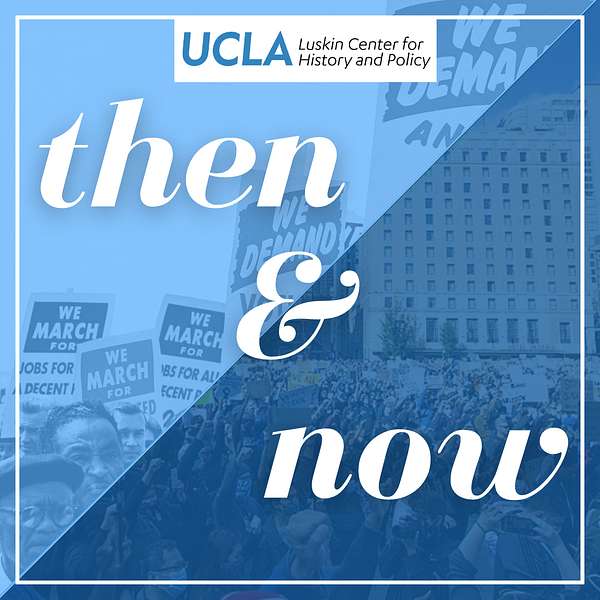
Then & Now
Then & Now connects past to present, using historical analysis and context to help guide us through modern issues and policy decisions. Then & Now is brought to you by the UCLA Luskin Center for History and Policy. This podcast is produced by David Myers and Roselyn Campbell, and features original music by Daniel Raijman.
Then & Now
Why History Matters: Reproductive Rights and Justice
In this week’s episode of then & now, we present a recording of a recent event hosted by the UCLA History Department, "Why History Matters: Reproductive Rights and Justice." This event brought together experts to explore the far-reaching effects of the Dobbs v. Jackson Women’s Health Organization decision in June 2022. Hosted by Kevin Terraciano, the conversation delves into the historical misuse of legal doctrines to limit reproductive freedoms and calls for a comprehensive reproductive justice framework that extends beyond abortion to include the right to have or not have children and to raise children in safe environments. Professor Cary Franklin critiques the Supreme Court's "history and tradition" test in Dobbs, arguing it distorts historical perspectives on liberty and equality, while Dean Alexandra Minna Stern discusses the lasting impacts of eugenic sterilization on marginalized groups, emphasizing how patterns of reproductive oppression persist today. Professor Elizabeth O’Brien examines Mexico’s recent Supreme Court rulings decriminalizing abortion and highlights grassroots activism's role in shaping a broader framework for reproductive rights in Latin America. In the U.S., maternal mortality and preventable deaths have risen sharply since the Dobbs decision, underscoring the panel’s call for historical research to inform advocacy as surveillance and criminalization of reproductive health grow. Through these comparative perspectives, the discussion powerfully illustrates how understanding historical contexts can guide efforts to protect and expand reproductive rights in the U.S.
Kevin Terraciano is a Professor and the Department Chair of History at UCLA. He specializes in Latin American history, especially Mexico and the Indigenous cultures and languages of central and southern Mexico. Among many books and translations, he is the author of The Mixtecs of Colonial Oaxaca: Ñudzahui History, Sixteenth through Eighteenth Centuries, a comprehensive study of Mixtec society and their adaptation to colonial rule.
Cary Franklin is the McDonald/Wright Chair of Law at UCLA and serves as the faculty director of the Williams Institute at UCLA as well as the Center on Reproductive Health, Law, and Policy. Her work has appeared in numerous publications including the Harvard Law Review, the Michigan Law Review, the NYU Law Review, the Supreme Court Review, the Virginia Law Review, and the Yale Law Journal.
Alexandra Minna Stern is a professor of English and history and the Dean of UCLA’s Division of Humanities. She co-directs the Sterilization and Social Justice Lab, which studies eugenic sterilization practices in the U.S. and their impact on marginalized groups. She is the author of the award-winning Eugenic Nation: Faults and Frontiers of Better Breeding in Modern America, and the author of Telling Genes: The Story of Genetic Counseling in America, which was named a Choice 2013 Outstanding Academic Title in Health Sciences.
Elizabeth O’Brien is an Assistant Professor in the UCLA Meyer and Renee Luskin Department of History, specializing in the history of reproductive health in Mexico. Professor O’Brien is also a member of the cross-field group in the History of Gender and Sexuality. Professor O’Brien's 2023 book on colonialism and reproductive healthcare in Mexico, Surgery and Salvation: The